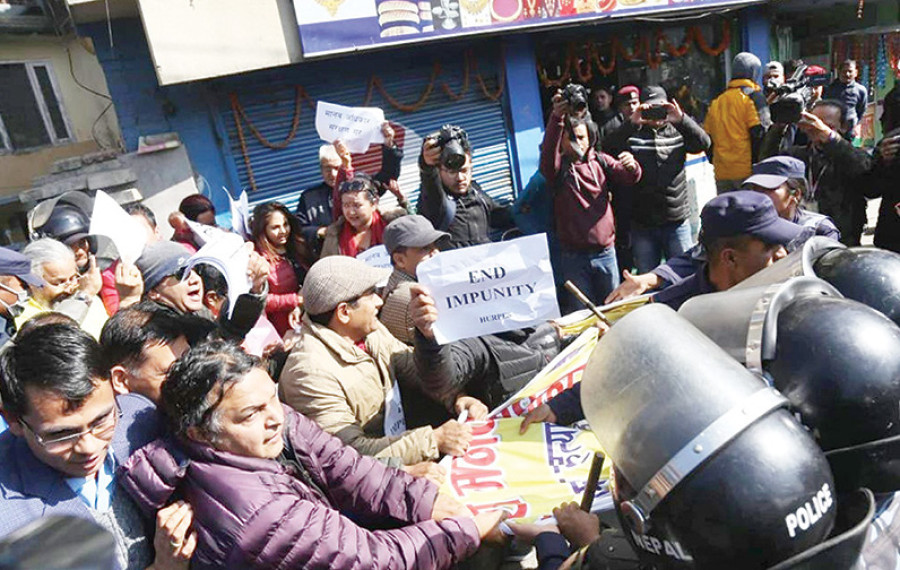National
Another case spotlights apathy towards rights body
Ministry of Home Affairs asks the National Human Rights commission to review its recommendations on alleged extra-judicial killing of Kumar Poudel.
Binod Ghimire
In yet another case of government apathy towards the National Human Rights Commission, the Ministry of Home Affairs has sent back its recommendation to charge police personnel with extrajudicial killing, demanding that the constitutional body review its decision.
The commission on October 22, 2019, asked the government to press charges against three policemen for their involvement in the alleged extrajudicial killing of a district-level leader of the banned Netra Bikram Chand-led outfit in June that year. But the government hadn’t done so.
“The request for a revision is nothing but an attempt to stall the implementation of our recommendations,” Bed Bhattarai, secretary and spokesperson for the commission, told the Post. “I don’t see any room for revision as the recommendations were made after a detailed investigation. However, the commission is yet to decide on the matter.”
The commission concluded that Kumar Paudel, then Sarlahi district in-charge of the Netra Bikram Chand-led Communist Party of Nepal, was killed in police custody, and not in an encounter with police on June 20 in Lalbandi, Sarlahi—as claimed by authorities.
In its recommendations, the rights watchdog asked the government to suspend and press criminal charges against Inspector Krishnadev Prasad Sah and Senior Constables Binod Sah and Satya Narayan Mishra for their involvement in the incident. Similarly, it recommended that Inspector Kiran Neupane and Sub-inspector Surya Kumar Karki be reprimanded as they provided false field reports on the incident.
The commission’s recommendations in the Paudel case are one of thousands made by the rights body since its establishment two decades ago. According to the commission, hardly 12 percent of its 1,186 different recommendations in 12,822 cases have been implemented fully so far, even as most recommendations involve provision of compensation and relief, rather than legal action against individuals or groups.
“Successive governments in the past have resorted to various excuses to not implement recommendations made by the commission,” said Bhattarai. “Request for revision is one of the tactics officials use to stall the case,” he said.
It is a constitutional and legal duty of the government and its agencies to implement the recommendations from the rights body—something the commission’s officials have been reiterating for a long time, but in vain.
Commission chair Anup Raj Sharma drew the attention of the government towards implementing the rights body’s recommendations in his speech on the occasion of the 20th anniversary of the commission in May.
“It is unfortunate that the government is not following abiding by its constitutional and legal obligations to implement the commission’s recommendation while impunity continues to prevail,” he said in a statement.
Former commission officials say though there have been major political transformations in the country, but the government’s attitude towards human rights hasn’t changed. “What good can you expect from the government that rejects the recommendations of a constitutional body?” Ram Dayal Rakesh, a former member of the commission, told the Post. He said hundreds of the decisions by the commission made after intense investigations have gone unimplemented. In some cases, those involved in atrocities have rather been rewarded.
An investigation by the commission implicated then Senior Superintendent Chuda Bahadur Shrestha, Superintendent Kuber Singh Rana, Major Anup Adhikari and Chief District Officer Rewati Raj Kafle in the alleged extrajudicial killing of five youths in Dhanusha in 2003 during the Maoist insurgency. Though the commission recommended that the government take legal action against the security officials, none of them was charged or even reprimanded. In 2012, the Baburam Bhattarai-led government promoted Rana to the post of inspector general.
The government’s reluctance to implement recommendations made by the commission has also received international attention. In its report made public on Thursday, the International Commission of Jurists, an international non-governmental organisation of the judges and lawyers, said the government’s implementation of decisions by the constitutional commission wasn’t satisfactory. While contesting for a seat on the United Nation Human Rights Council in 2017, the government had vowed to implement the recommendations of the commissions and equip it with the resources.
It has made similar pledges again as it aspires to seek a second term on the council (2021-2023). But experts doubt it would bring any changes to the attitude towards the commission.




 20.12°C Kathmandu
20.12°C Kathmandu














